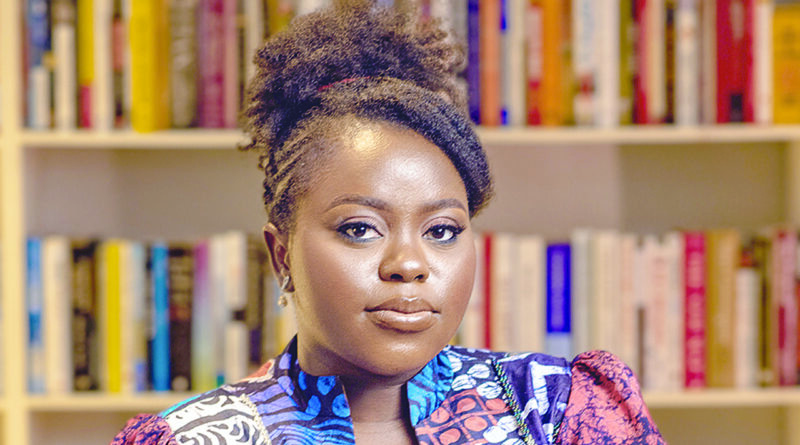Empowering Women in STEM: Oladiwura Oladepo’s quest for gender parity in African tech space
‘Most Micro Businesses Owned By Women Are Not Leveraging The Digital Space’
Oladiwura Oladepo is the Executive Director and Co-Founder at Technology for Social Change and Development Initiative (Tech4Dev), a non-profit enterprise that creates access to decent work and entrepreneurship opportunities and platforms for Africans through digital skills empowerment and advocacy. Through her activities, she creates opportunities for improved economic livelihood for young Africans, especially in underserved communities by empowering them with digital and soft skills, which have directly impacted 120,298 beneficiaries in over 30 African countries.
Her passion for gender parity and improved economic outcomes and financial independence led her to championing the cause for more women in Science Technology Engineering and Mathematics (STEM). This drive led to the birth of the Women Techsters Initiative, which has grown to become one of Africa’s largest women-in-tech tuition-free programmes aimed at bridging the digital technology knowledge divide between men and women across low-income communities in Africa. Oladiwura has a Master of Advanced Management from Yale School of Management and an MBA from Lagos Business School, Pan-Atlantic University. She is a United Nations Solutions Summit Solution Maker 2019; a member of the Forbes Non-profit Council; a Social Entrepreneur Fellow of Jacobs Foundation and a member of the Injini Think Tank Advisory Committee. She has served on the Executive Board of the Lagos Business School Alumni Association. In this interview with IJEOMA THOMAS-ODIA, she speaks on her passion for gender parity and how she is championing the cause across Africa.
You have an illustrious career. How did your journey into the world of tech start?
My journey started in 2014 during the Ebola virus outbreak in Nigeria. My father, being a Professor of Public Health, had expressed concern about the fact that the government was not doing enough to get information about Ebola to people quickly. He noted that even people in the cities did not have sufficient information about Ebola, and that the disease was likely to spread more quickly in urban areas due to the increased frequency of human interaction. Based on this information, my co-founder, Joel Ogunsola, and I brainstormed and thought about the best ways to quickly disseminate information to the public on how to prevent the spread of the virus. At the time, Joel was working at Microsoft; he was the one with the technology knowledge and expertise. He came up with the idea of developing an informational website called “Stop Ebola.”
However, it was difficult finding people with the technical expertise we needed to build the site. We eventually got someone, but the website development timeline took way longer than expected. Eventually, we got the site up and running and Joel was able to get some ambassadors to push awareness about the website through the Future Project where he was a volunteer. During the lifecycle of Ebola in Nigeria, the website helped disseminate information and had close to a million visits. Surmounting that hurdle and getting the solution live was the eye-opener that marked the beginning of Tech4Dev.
What informed your passion for creating access for Africans to explore digital skills opportunities?
After the “Stop Ebola” project, we went on to setup Tech4Dev with the mission to solve the world’s greatest problems in three core areas – Public Health, Civic Engagement, and most importantly, Digital Education – which would go on to become the focus of what we do now. We realised that technology was the future and that Africans needed to have access to the right skill set to become contributors and not only consumers. At the same time, technology provides access to opportunities for decent work. Given the statistics of poverty on the continent, we envisioned that empowering people to gain digital skills that will improve their socio-economic realities was the right direction to go. So, in 2019, we decided to fully focus on digital education, which involved digital skills training, job matching and advocacy.
How are you driving this change through your non-profit, Tech4Dev?
Our determination is to drive economic inclusion for under-resourced and underrepresented communities not just in Africa, but also across the globe, using digital skills empowerment and advocacy as a tool or a pathway with the ultimate aim of ensuring that we can provide decent work and entrepreneurship opportunities to these communities. That’s how we are driving change as an organisation. To achieve this goal, we have worked with several indigenous and international organisations, working tirelessly with public and private partners to roll out several digital and technology skilling programmes to different beneficiary groups. At the moment, we are going beyond Africa. We recently opened an office and will be starting operations in the United States to expand our mission as an organisation.
What is your take on the level of financial literacy awareness among women?
A study by the African Development Bank found that a staggering 70 per cent of African women lack financial literacy, particularly in the context of today’s digital world. With the increasing number of women entrepreneurs and their growing involvement in the workforce, enhancing financial literacy for women has never been more crucial. I believe every woman should have the knowledge of how to manage money effectively, budget, save and invest. But the question is: How many women especially in rural and underserved parts of the continent have this knowledge? Not many. The realisation of this fact is why Tech4Dev has integrated financial literacy classes into its Women Techsters Fellowship and Women Techsters Bootcamp programmes. The aim is to equip women with the knowledge and skills to effectively manage their finances, which will enable them to make informed decisions about savings and investments whilst they are gaining the skills that will help them make money.
You are quite passionate about gender parity and improved economic outcomes. What have been some of your activities in this line?
My passion for gender parity and improved economic outcomes is what led to the creation of The Women Techsters Initiative. The vision of this initiative is to improve the economic power of women in Africa, particularly those in underserved and under-resourced communities using technology skills as a pathway to enable them access jobs or start businesses. The programmes under the Women Techsters Initiative are unique in that they are split into advocacy and empowerment. The advocacy components include our Open Days; focused on enabling women to make decisions to start career in tech through learning from other experienced women in tech; and the Tech Girl Drive, which is built around empowering young girls in primary and secondary schools with the right information about STEM with the hope that in the future, they will be willing to go into tech.
From there, they move into our empowerment programmes starting from the bootcamp, which is a three-week intermediate experiential learning programme; then they move to the Fellowship, a one-year programme that consists of six months of learning and six months of internship placement or business incubation. We also have the masterclass, which is for women already in tech who are looking to learn a focal area of speciality in technology.
Since its inception, the Women Techsters’ sub-programmes have directly reached 101,645 beneficiaries. The Tech Girls Drive alone has reached 81,665 girls across 22 African countries. Beneficiaries from the Fellowship stand at 1,081, Bootcamp 7,972, Open Day 10,265, masterclass 662. What makes the Women Techsters Initiative exceptional is that the empowerment training leads directly to jobs or entrepreneurship. Statistically, eight out of 10 beneficiaries who go through the intermediate programme gain access to jobs.
Are you satisfied with the number of women embracing STEM?
I am not satisfied with the status quo, which is why I am striving to make a change. For example, in urban areas across Africa, the number still stands at eight men to two women in terms of participation in tech. In suburban areas, the number is close to zero for women in technology. So, we are still far from where we want to be. My goal is to see women’s participation in STEM reach a 50-50 ratio and this is not because it sounds good. When you look at Africa’s population, the ratio of women to men, it is almost 50-50; so, why can’t we have a 50-50 representation in STEM? That’s why we want to contribute in our own way by reaching five million women across Africa by 2030 and empowering them with technology skills.
Do you think that more entrepreneurs are leveraging the digital space to drive their businesses?
I think today’s entrepreneurs are leveraging the digital space to grow their businesses, but the percentage is still very low due to the low rate of digital penetration in the country. For example, women own most micro businesses and they are not leveraging the digital space as much as they should and that’s why Tech4Dev is developing a digital tools playbook for women entrepreneurs. We want to help them leverage the digital space to grow their businesses and contribute to the economy. This playbook will teach them how to best use digital tools to improve their businesses.
How best do you think the nation can deploy technology to drive financial inclusion and create socio-economic opportunities especially for women?
While deploying technology is important, it is also essential to ensure that people can use the technology that is already available. In many cases, people are reluctant to use technology because they lack the necessary skills and knowledge. We need to focus on helping people to use the technology that exists so that they can reap the benefits.
What advice do you have for women who struggle with getting a hold on their career?
I always encourage women in tech or any career path to seek out communities and mentorship opportunities that can help them achieve their goals. These could be attending forums and events focused on women’s growth and advancement. I am inspired by the story of Belinda Opola, a Women Techsters Class of 2023 fellow from Kenya, who overcame challenges to achieve success in the tech industry. Belinda had taken a six-year career break and when she was ready to return, she found it difficult to fit in. But her perseverance and the supportive community provided by Tech4Dev’s fellowship programme helped her get back on her feet. The support helped her achieve the highest academic distinction, Summa Cum Laude, upon completing the Women Techsters Fellowship Data Science learning track. Even when her role transitioned from Procurement and Logistics Coordinator to IT Service Delivery Lead at her organisation, she was able to adapt seamlessly due to the soft skills she acquired in the programme, such as recognising and overcoming imposter syndrome, negotiating effectively and embracing new challenges. Her experience speaks to the importance of having a supportive community and mentorship for women in tech. That’s why at Tech4Dev, we have an active community of women that provide aspiring women in tech with the guidance and encouragement they need to succeed.
What is your life mantra?
Be excellent at what you do. The world only looks for excellent people.




